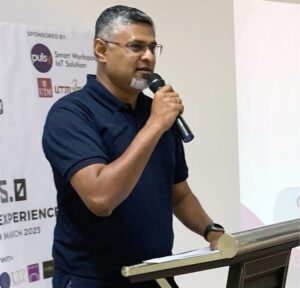KUALA LUMPUR, March 24 — The adoption of digitalisation has proved to be a game-changer for small-and-medium-enterprises (SMEs) in Malaysia which helped them to overcome the challenges posed by the Covid-19 pandemic while positioning themselves for long-term success.
Digitalisation has not only played a crucial role in helping SMEs in Malaysia to enhance their productivity in the post-pandemic work culture, but it has also assisted SMEs to reach a broader customer base, providing them access to a larger market, thus contributing to the growth of their businesses.
Chairman of the Digital Internet Association of Malaysia (iaM) K Nantha Kumar said digitalisation has increased the overall productivity of SMEs in Malaysia and allowed them to remain competitive in the fast-evolving business landscape.
“By adopting digital technologies such as cloud computing, automation and e-commerce, SMEs can streamline their operations, reduce manual processes and improve efficiency,” he told Bernama in a recent interview.
However, Nantha Kumar said a cohesive and structured approach is needed to support SMEs in Malaysia in automation and digitalisation, adding that such an approach can help SMEs overcome common barriers to digital adoption, including lack of digital skills and limited access to funding.

He said doing so can provide SMEs with the resources and support they need to adopt and utilise new technologies effectively, adding that the approach method should include measures to improve digital skills, finance access, and digital infrastructure development.
“It should also involve collaboration between the government, private sector organisations and SMEs to ensure that the needs of small businesses are met,” Nantha Kumar added.
He cited a report by the United Nations Conference on Trade and Development (UNCTAD) highlighting digital solutions fostered by new technologies, such as blockchain and the Internet of things, which the potential to support export facilitation for SMEs in the most vulnerable countries.
On the support given by iaM in helping SMEs in Malaysia to digitalise their businesses, Nantha Kumar said for the past five years, iaM has focused on creating awareness of the Internet of Things (IoT), Cyber security and Big Data.
“In the long run, iaM aims to increase awareness of digitalisation and automation by focusing on Smart Cities, Smart Agriculture, Smart Health, Smart Tourism, Smart Schools and Smart Sports,” said the chairman, who set up iaM together with a group of talented individuals and companies to share knowledge on the digital application.
He also believes that increasing grants and facilities through government organisations such as Malaysia Digital Economy Corporation (MDEC), Malaysian Research and Development Information Network (MRANTI) and the SME Corporation can play a crucial role in supporting SMEs in their efforts to automate and digitise their businesses.
“This support can help SMEs not only to rebound from the pandemic but also to improve their competitiveness in the digital economy,” Nantha Kumar said.
— Bernama





